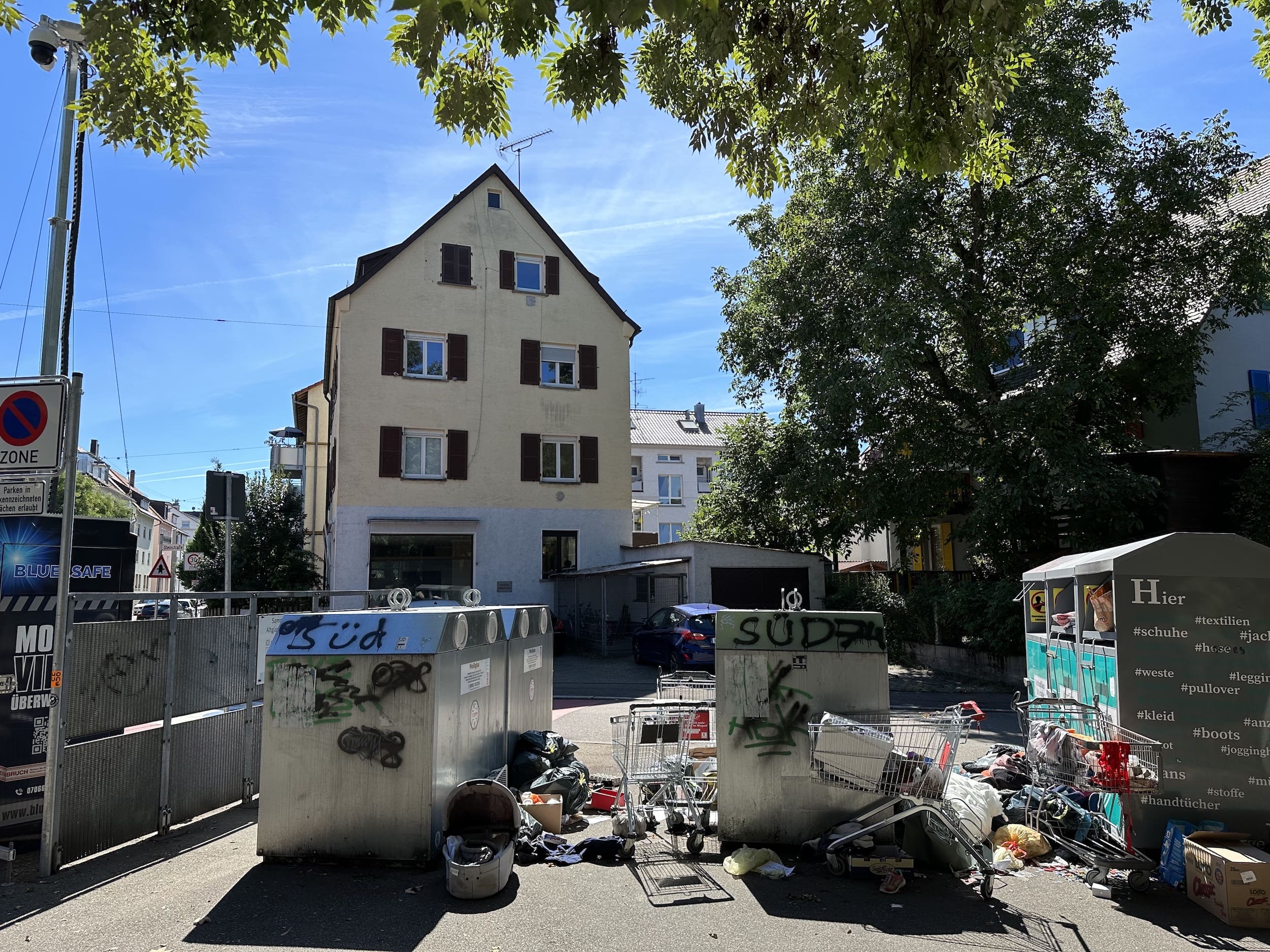Feature photo: video-monitored collection point for recyclables
In this blog post, this word does not refer to the well-known sausages that some people like to eat, but to the term for Germans who do not feel at home in Germany or are not recognized or even perceived as such by other Germans.
I think I first used the word Deutschländer in this sense in 2007 Seyran Ateş read the book “Der Multikulti-Errtum. How we can live together better in Germany”. This neologism does not do justice to the issue of citizenship, whether used positively or negatively, and only shows that we have greater challenges to overcome here as well.
Everything is regulated in Germany, even if you are German. You can do this in Citizenship Act (StAG) and get to the point right at the beginning (§1): A German within the meaning of this law is someone who has German citizenship.” And this is certified by German administrative employees. And the renunciation is also regulated in a paragraph (§ 26(1)): "A German can renounce his citizenship if he has several citizenships. The waiver must be declared in writing.” and must also be certified by an administrative employee.
And even a withdrawal of German citizenship would be possible, but for this you have to refer to Section 16(1) of the Basic Law: “German citizenship may not be withdrawn. The loss of nationality may only occur on the basis of a law and against the will of the person concerned only if the person concerned does not become stateless as a result.”
But all Germans have something in common, because with the rights come the duties and a few other commandments, which, among other things, apply despite or precisely because of the "grace of late birth" (in the sense of Gunter Gauss and not that of Helmut Kohl plagiarized) result. It's better Richard von Weizsacker as formulated in his speech on May 8, 1985: “We all, whether guilty or not, whether old or young, must accept the past. We are all affected by their consequences and held responsible for them.”
This is very prominently recorded in Article 1(2) of the Basic Law: (2) "The German people are therefore committed to inviolable and inalienable human rights as the basis of every human community, of peace and justice in the world." Duty for every citizen to stand with both feet firmly on the ground of our free democratic basic order.
From the very beginning, our constitutional fathers and this probably still under the impression of the formula coined by the National Socialists "One people, one Reich, one leader", but also the attempts in Germany that began at the end of the 19th century and have been unsuccessful to this day, was a "people's nation". to create the mistake of speaking of a single people in the Basic Law, but then not defining this further and more precisely except for the federal states (actually also peoples).
A capital mistake, especially in view of European history and especially because of the further networking of our one world. If there was a single state in Europe that could unite a single people (ethnicity), it was definitely not Germany. As we all know, even the Holy Roman Empire was an association of German nations, and it is not for nothing that we are first a confederation of states and later a federal state from the beginning. And that's how it should be called German peoples, but that doesn't really work either, because there are also Germans outside the scope of the Basic Law who live as minorities in their countries and can also claim it for themselves, although not in the sense of the Basic Law, but because of their ethnicity (nationality) to be German — at least most of them meet the basics of an ethnicity that are still valid today: language, culture and religion.
This problem of ethnic affiliation and the fact that the existing countries, empires and principalities in Europe cannot be brought into line with them was recognized as early as the Middle Ages, when attempts were made to summarize the peoples of European character. And even before politicians agreed, it was common practice for at least merchants, craftsmen, intellectuals and artists to move from one country to the next. And so the first guest workers from Italy may have been employed during the construction of Heilbronn's Kilianskirche.
It is also exciting that by the 17th century at the latest, people were already thinking about whether the Russians (then still Muscovites) and Turks actually belonged to the peoples of European nature or not. And half a millennium later, it's still being debated — both sides need to think about why it's still the case.
And so we have to assume that if you want to continue to hold on to the nation states, in Germany, in addition to the classic German peoples, not only the Danube Swabians and Volga Germans, but also Kazakhs, Uzbeks, Turks, genuine Russians, Hungarians, Italians, these then also further differentiated as Sicilians or Lombards, Athenians, Greeks, French, Poles, Chinese, Indians, Angolans and many more who are Germans according to the StAG and thus also belong to the German people.
The example of many Poles who came here as part of the industrialization of Germany shows that it is possible for many Germans who have immigrated to Germany to integrate into our people and, thanks to freedom of religion, it is no longer necessary to convert to Christianity convert. And so it is quite possible for a migrant to become fully integrated into our society in less than 20 years. Others need one or two generations for this and others will never make it or don't want to - which does not change their ethnicity, however, as long as they do not ultimately renounce such an ethnicity in accordance with StAG § 26(1). However, some, including many high-performing migrants, later chose to continue migrating and become US, Canadian, New Zealand or Australian citizens.
And so we will continue to have very different Germans in Germany, as is also the case in many other countries, which are also in the most diverse stages of their own Germanness. We all experience that this is not easy every day.
Further migratory movements make things even more difficult, consisting either of refugees or those just looking for work or comfort and who make no claim whatsoever to wanting to be German.
Even under optimal conditions, this leads to a mixed situation, whereby the different cultures and religions collide even without major efforts on the part of all those involved and the whole thing is exacerbated even further by the lack of a common language.
So far, we can all be very happy that Germany still has sufficient capital and reserves to keep everyone involved - including the richest of the rich - in a sufficient mood through transfer payments and thus prevent major upheavals.
About what is happening and how to deal with this situation, has e.g Michael Wolffsohn In 2018 he wrote a controversial book, “Zum Weltfrieden”, about different communication spaces that already exist in Germany and continue to diverge.
If one assumes that for most Germans and also the other people living in Germany a "European civilization" (Kemal Atatürk) or at least a European community of nations does not play a role, both of which could be the unifying bond and a European federal state that could in any case defuse the existing citizenship problem is out of the question, then the only thing that remains - apart from the already discussed receipt of social benefits - only the Basic Law with its commitment to democracy, general human and European civil rights exist as a common feature of all people living in Germany.
And this is precisely where we all weaken, and especially the Turkish and Russian-born sections of the population hurry every day not only to question our democracy and to fight our existing alliances (NATO, Council of Europe and EU), at least verbally, but they also ask more and more often questioning all of our basic values and more and more openly complaining about a totalitarian system in Germany, just like they are used to at home or at least that of their own grandparents.
I wrote one in 2005 Blog post on integration, although at that time I firmly assumed a positive concept of integration and was convinced that we can integrate (almost) all migrants into our society, just as it had been possible in the previous centuries, from the Huguenots to the Poles. At the time, this was due to the fact that I had been working very constructively with migrant associations for a good 25 years and had already been living in Poland with my family for three years; there we all learned Polish right from the start — although only in the country for a maximum of four years — and did not surround ourselves with the German minority in Poland, but used the time to get to know the Poles and Polish culture better — we wanted to be integrated.
Today I have to recognize that very many migrants do not want this integration at all, but prefer to exist in their own parallel world, thereby evading their civic responsibility and quite logically doing more harm than good to our common country.
And as already mentioned, it is again migrants from the former Soviet Union and Turkey who stand out in particular, and thus those people from the 17th century who spoke out against the integration of Turks and Muscovites in a common Europe were right give. It is frightening to see how quickly pan-Slavism and “Young Turkism” are becoming acceptable again!
Even more frightening how these people writhe in their unhappiness at having to live here with us. How they lament and complain that the Germans, although they are mostly Germans themselves, don't take them seriously or even value them - Germans, that's all.
But the world is so big! What I really don't understand is that the very Germans who Vladimir Putin not only seen as genuine democrats, but now even revered as GröFaZ, or those Germans who think Recep Recep Tayyip Erdoğan be godlike, don't just jump at the chance to support your favorite local politicians in the Russian Federation or in Turkey. I know from a safer source that both of them need all the help they can get right now!
Dear Germans, be real men or women for once in your life, make use of your right under paragraph 26(1) in the StAG and become the best Russians or Turks of all time!
Incidentally, there are millions of Germans before you who have made use of this right and found happiness in other countries.
If you do want to remain German, then it will help us all if you slowly but surely make friends with the Basic Law, if you haven't already done so, learn your old or even new mother tongue and finally get involved in the adventure Being German in the 21st century — by the way, that's not so easy even for long-established Germans!









You might imagine an uncharitable extraterrestrial observer looking down on our species over all that time – with us excitedly chattering. “The universe is created for us! We're at the center! Everything pays tribute to us!” – and concluding that our pretentions are amusing, our aspirations pathetic, that this must be the planet of idiots. (Carl Sagan: Pale blue dot)
To see clearly, a change of perspective is often enough...
Exciting thought: Anyone who adheres to the Basic Law of the Federal Republic of Germany is a German. This means that many so-called “organic Germans” are likely to lose their status as “Germans”. In other words: I much prefer the “Spätzelelestürk” who lives and promotes the Basic Law every day to the German nationalist wannabe whose understanding of democracy is more than doubtful. And with this we also have the basis of a dominant culture: the Basic Law of the Federal Republic of Germany. This may not appeal to some right-wing conservative politicians as well as to the self-proclaimed “German nationalists” who want to link citizenship to the consumption of wheat beer and white sausage (and forget that there are also Quarterschlotzer and Äppelwoi drinkers).
In our case, de jure, every German has the Basic Law as their basis and guiding culture. Unfortunately, as long as we continue to rely on nation states, this citizenship problem cannot be solved. And so all those who have inherited their citizenship continue to be protected.
What we could do, however, would be to revoke citizenship from all those who obtained it fraudulently - and there are many more than we suspect. Before receiving German citizenship, everyone must commit to our Basic Law without any ifs or buts. Unfortunately - I had such conversations yesterday - since receiving German citizenship, these Germans not only continue to support their “former” state, but also admit without hesitation that they reject democracy and our values out of full conviction.
In doing so, these people confirm that they acquired German citizenship through fraud and could therefore lose it very quickly, provided they still have their old citizenship.
The problem is that when it comes to the oath, they deny this old one and even throw the proof of it in the trash - which is what many refugees have now taken as an example.
And so these Germans continue to be our fellow citizens. Our authorities usually refuse to clarify these issues further out of convenience and, for example, B. in the Russian Federation or Turkey to ask whether Mr. Maier also has another citizenship.
We will only solve this problem when we raise everyone's bread baskets higher again in Germany. Because then our own “enemies of the state” must at least contribute something to our state.